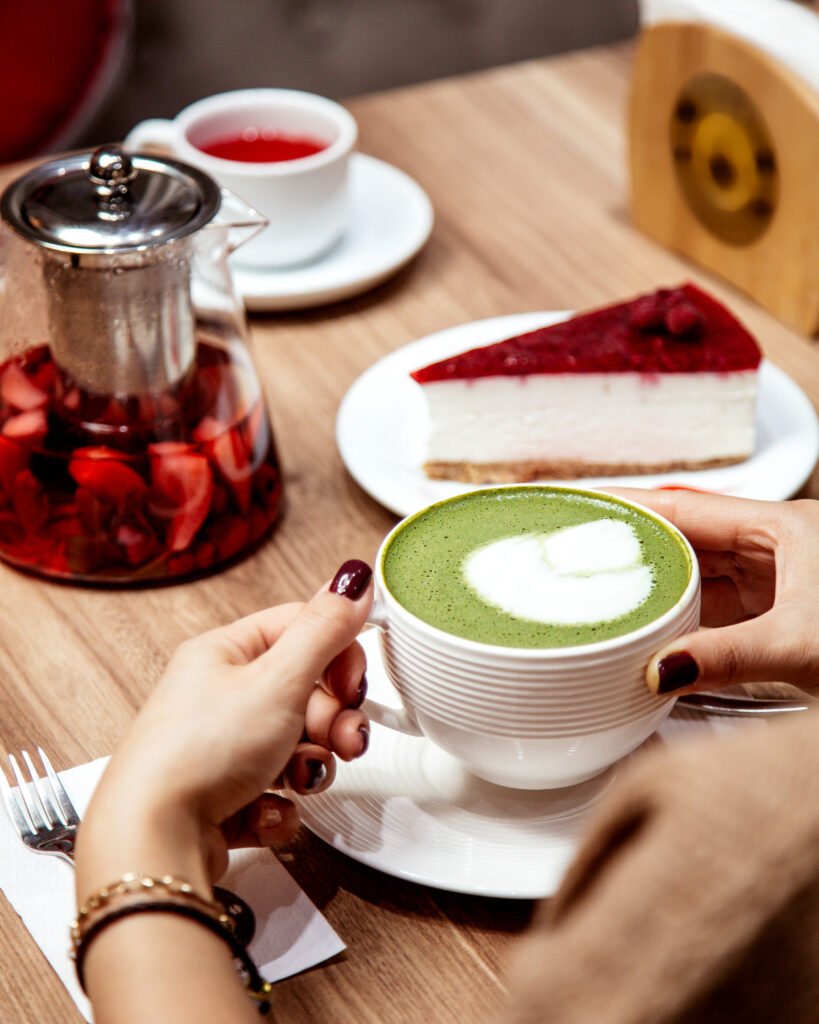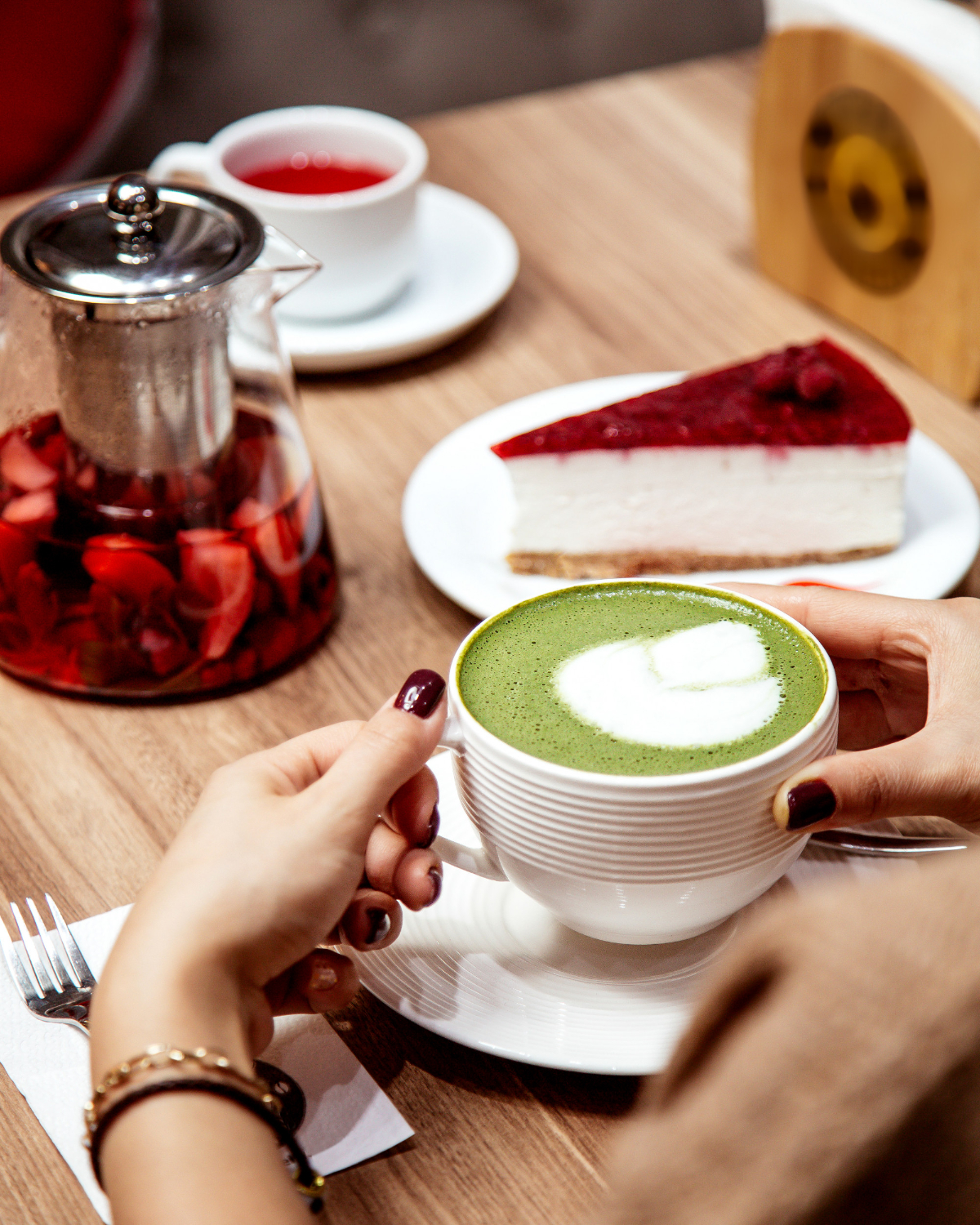
Overview
In the world of health-conscious beverages, two drinks stand out: coffee and matcha. Both have loyal followers and a rich history, but when it comes to health benefits, the question remains: which one is better for you? With both offering unique qualities, it’s important to dive deeper into how coffee and matcha affect your body and mind. In this blog post, we’ll explore the health benefits, compare key factors, and help you decide which drink might suit your daily routine and overall wellness goals best.
What is Coffee?
Coffee is one of the most beloved beverages around the globe, made from roasted beans of the Coffea plant. Its bold flavor and invigorating qualities have made it a morning ritual for millions. Known for its high caffeine content, coffee is often associated with a quick energy boost. Typically, it’s enjoyed black or with additions like milk, sugar, or cream. Whether it’s a shot of espresso, a cup of drip coffee, or a cold brew, coffee is available in a variety of forms to suit anyone’s taste.
But beyond its role as an energy booster, coffee has numerous health benefits that make it much more than just a morning pick-me-up.
Health Benefits of Coffee
- Increases Energy and Focus
One of coffee’s key attractions is its caffeine content, which averages about 95 mg per cup. Caffeine works by blocking adenosine, a brain chemical that makes you feel tired, thereby enhancing alertness and focus. This makes coffee an ideal beverage for those needing a quick mental or physical boost.
- Packed with Antioxidants
Coffee is a significant source of antioxidants, compounds that fight off harmful free radicals in the body. These antioxidants—mainly polyphenols—play a key role in reducing inflammation and lowering the risk of chronic diseases. Studies suggest that coffee contains more antioxidants than most other beverages, including tea
Related : What Happens to Your Body When You Drink Tea Every Day
- Potentially Lowers the Risk of Type 2 Diabetes
Research shows that regular coffee consumption is linked to a reduced risk of developing type 2 diabetes. The bioactive compounds in coffee may improve insulin sensitivity, helping the body regulate blood sugar more effectively.
- Improves Heart Health
Though coffee was once thought to contribute to heart disease, recent studies show that moderate coffee consumption may actually lower the risk of heart disease and stroke. Coffee drinkers tend to have healthier arteries and a lower risk of heart failure.
- Protects Brain Function
Coffee may protect against neurodegenerative diseases like Alzheimer’s and Parkinson’s. Regular coffee consumption has been associated with a lower risk of these conditions, possibly due to the protective effects of caffeine and its influence on brain function.
- Supports Fat Loss
Caffeine is a common ingredient in weight loss supplements, and for good reason. Coffee has been shown to increase fat burning by boosting metabolism and stimulating the central nervous system. A cup of coffee before a workout may enhance fat oxidation and improve exercise performance
Related : Benefits of Hibiscus Tea
What is Matcha?
Matcha, a form of powdered green tea, originated in Japan and has been used for centuries in traditional tea ceremonies. Unlike regular green tea, where leaves are steeped and discarded, matcha involves consuming the entire tea leaf in powdered form. This method of preparation makes matcha much more concentrated in nutrients compared to regular tea.
Known for its vibrant green color and distinctive, slightly sweet taste, matcha has gained popularity worldwide for its calming, focused energy and impressive health benefits.
Health Benefits of Matcha
- Sustained Energy Without Jitters
Matcha contains less caffeine than coffee, typically ranging from 35 to 70 mg per serving, depending on the preparation. However, the presence of L-theanine, an amino acid found in matcha, results in a slow release of caffeine into the bloodstream. This provides a calm, steady energy without the jittery feelings or crashes often associated with coffee.
- Rich in Antioxidants
Matcha is loaded with antioxidants, particularly catechins, which are linked to cancer prevention and heart health. One of the most potent catechins, EGCG (epigallocatechin gallate), is known for its anti-inflammatory and anti-cancer properties. Matcha contains significantly more antioxidants than other types of green tea, making it a nutritional powerhouse
Related : how coffee and tea boost your health daily
- Boosts Metabolism and Aids Fat Burning
Matcha is a popular choice for those looking to enhance fat burning and improve metabolism. Research has shown that drinking matcha can increase fat burning during exercise by up to 17%. The combination of caffeine and catechins in matcha makes it a great option for those looking to lose weight or maintain a healthy body weight.
- Promotes Detoxification
The high chlorophyll content in matcha not only gives it its vibrant green color but also aids in detoxifying the body. Chlorophyll helps to eliminate heavy metals and harmful toxins, making matcha an excellent choice for those looking to cleanse and purify their system.
- Calms the Mind and Enhances Focus
Matcha’s unique combination of caffeine and L-theanine promotes a calm, focused state of mind. L-theanine increases the production of alpha waves in the brain, which are associated with relaxation and concentration. This makes matcha a great option for anyone who needs to stay mentally sharp and relaxed at the same time.
Coffee vs. Matcha: A Health Comparison
- Caffeine
When comparing the caffeine content of coffee and matcha, coffee clearly has the upper hand, with around 95 mg of caffeine per cup compared to matcha’s 35-70 mg. If you’re looking for a quick energy boost, coffee is likely the better option. However, if you prefer sustained energy without the crashes or jitters, matcha’s more gradual release of caffeine may suit you better.
- Antioxidants
While both coffee and matcha are rich in antioxidants, matcha takes the lead in this category. Matcha is especially high in catechins like EGCG, which have been linked to lower cancer risk and improved cardiovascular health. Coffee is still a good source of antioxidants, particularly polyphenols, but matcha may provide more potent benefits in this area.
- Mental Clarity and Focus
While coffee can improve cognitive performance and alertness, it may also cause restlessness or anxiety in some people due to its high caffeine content. Matcha, on the other hand, promotes calm, focused energy thanks to its combination of caffeine and L-theanine. If you need sustained mental clarity and focus without the crash, matcha is likely the better choice.
- Weight Loss
Both coffee and matcha can support weight loss, but they do so in slightly different ways. Coffee boosts metabolism and increases fat burning primarily through its caffeine content. Matcha not only boosts metabolism but also enhances fat oxidation, especially when consumed before exercise. In addition, matcha’s detoxifying properties can further support weight loss and overall health.
Which One Should You Choose?
The choice between coffee and matcha depends largely on your personal preferences and health goals.
- If you need a fast energy boost: Coffee might be your go-to beverage. It provides an immediate kick of caffeine, making it ideal for a quick mental and physical lift, especially in the morning.
- If you prefer sustained energy and calm focus: Matcha is the better option. The slow release of caffeine and the calming effects of L-theanine provide steady energy without the crashes or jitters that coffee can sometimes cause.
- If you’re focused on detoxification and long-term health: Matcha stands out for its high levels of antioxidants, chlorophyll, and detoxifying properties, making it an excellent choice for improving overall health and supporting weight loss efforts.
- For better heart and brain health: Coffee may offer a slight edge when it comes to preventing certain diseases like Alzheimer’s and Parkinson’s, though matcha’s high antioxidant content also supports heart health and cancer prevention.
Can You Enjoy Both?
Absolutely! Many people enjoy the best of both worlds by incorporating both coffee and matcha into their routine. For instance, you might start your day with a cup of coffee to kickstart your morning and enjoy matcha in the afternoon for a calm, focused energy boost. By doing this, you get the benefits of both drinks while avoiding over-reliance on caffeine from one source.
The Takeaway
Both coffee and matcha have their own unique health benefits, and the choice between them depends on your personal needs and preferences. Coffee is excellent for a quick energy boost, improving cognitive function, and supporting heart and brain health. Matcha, on the other hand, provides a more sustained, calming energy while offering powerful detoxifying and antioxidant benefits.
Ultimately, there’s no need to choose just one. Both drinks can be part of a healthy, balanced lifestyle when consumed in moderation. Whether you’re a coffee enthusiast, a matcha lover, or someone who enjoys both, each beverage brings something valuable to the table. The key is to listen to your body and choose the one that best supports your health and wellness journey
Frequently Asked Questions
- Which has more caffeine, coffee or matcha? Coffee typically contains more caffeine, with about 95 mg per cup, compared to matcha, which ranges between 35-70 mg per serving. If you’re looking for a stronger caffeine kick, coffee is the better option, but matcha provides a more steady, calm energy due to L-theanine.
- Is matcha better for weight loss than coffee? Both coffee and matcha can support weight loss by boosting metabolism and fat burning. However, matcha’s combination of caffeine and catechins, particularly EGCG, makes it especially effective for fat oxidation, especially when combined with exercise.
- Can I drink both coffee and matcha in one day? Yes, you can absolutely enjoy both! Many people start their day with coffee for a quick energy boost and then switch to matcha later for sustained, calm energy. Just be mindful of your total caffeine intake.
- Is matcha healthier than coffee? Matcha has a higher concentration of antioxidants, particularly catechins like EGCG, which are linked to numerous health benefits, including cancer prevention. Coffee, on the other hand, is rich in polyphenols and is known to reduce the risk of type 2 diabetes, Alzheimer’s, and heart disease. Both are healthy, but in different ways.
- Does matcha cause jitters like coffee? No, matcha generally doesn’t cause jitters. Thanks to L-theanine, matcha provides a calming effect that balances out the caffeine, giving you sustained energy without the anxiety or crash often associated with coffee.
- Can matcha improve mental focus better than coffee? Matcha is known for enhancing mental clarity and focus, thanks to the combination of caffeine and L-theanine, which promotes relaxation without drowsiness. If you’re looking for long-lasting concentration, matcha may be more effective than coffee, which provides a faster but shorter boost.
- Which is better for heart health, coffee or matcha? Both coffee and matcha offer heart health benefits. Coffee has been shown to lower the risk of heart disease and stroke, while matcha’s high antioxidant content can improve cholesterol levels and reduce inflammation. Both drinks can contribute to heart health when consumed in moderation.
- How do matcha and coffee affect digestion? Coffee is more likely to stimulate digestion due to its caffeine content, which can help promote bowel movements. Matcha, on the other hand, is gentler on the stomach and contains chlorophyll, which aids in detoxification and may support digestion in a more balanced way.












